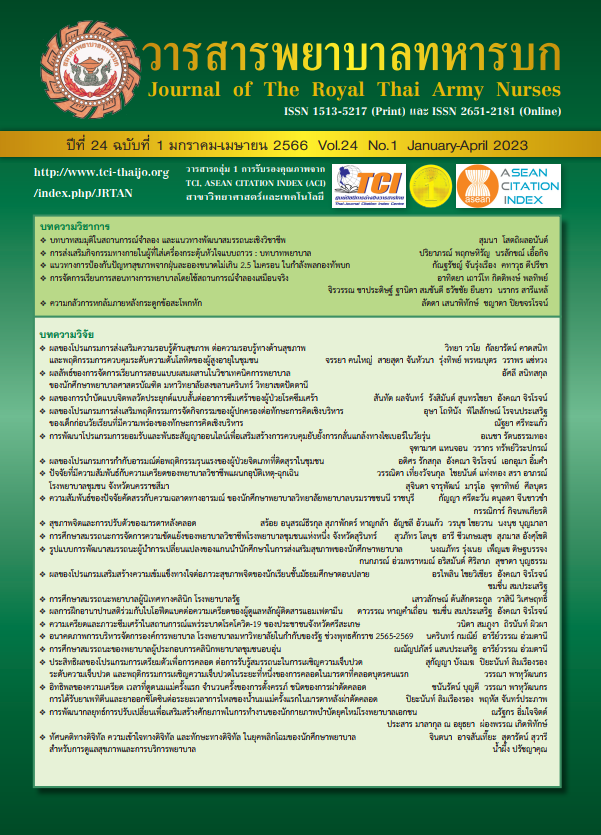Situation of Knowledge Management in Nursing Colleges under Praboromarajchanok Institute in the Northeastern of Thailand
Keywords:
Situation, knowledge management, nursing collegesAbstract
This mixed methods research aims to study the knowledge management situation in nursing colleges under Praboromarajchanok Institute (PBRI) in the Northeastern of Thailand. The research consists of a sample group: 254 nursing instructors and support personnel in 6 nursing colleges. The key informant is the deputy director, nursing instructors, and support staff. The research tool includes an organization’s knowledge management questionnaire, group discussion questions, and in-depth interviews, reviewed for content validity by five experts. The index of item-objective congruence ranged from 0.80 to 1.00. The Cronbach’s alpha coefficient was .85. Quantitative was analyzed by descriptive analysis and qualitative data was processed by content analysis.
The results indicated that the situation of knowledge management in nursing colleges under PBRI in the Northeastern of Thailand showed an overall performance average score was high level (x̅ = 4.31, S.D. 0.64). Considering each of the six aspects, they all had a high performance average score. The highest aspect is the administrator (x̅ = 4.37, S.D. 0.64), followed by communication (x̅ = 4.36, S.D. 0.63), learning (x̅ = 4.34, S.D. 0.63), personnel (x̅ = 4.33, S.D. 0.66), organization (x̅ = 4.32, S.D. 0.64) and information technology (x̅ = 4.18, S.D. 0.63) respectively. The key informant had views on knowledge management in each aspect regarding strengths and points that should be developed for applying in organization.
The results of this research will serve as the basic information for further development of the institute’s knowledge management model to become a learning organization.
Downloads
References
Chularut P. Learning management for students in the Thailand 4.0. Era Veridian E-Journal Silpakorn University 2017;1:2363-80. (in Thai)
Norashikin H, Safiah O, Fauziah N, Normala AI. Learning organization culture, organizational performance and organizational innovativeness in a public intuition of higher education in Malaysia: A preliminary study. Science Direct 2016;10:512-9.
Marquardt MJ.Global human resource development. Englewood Cliffs, New Jersey: Prentice Hall; 2002.
Zouari MBC, Dakhli SBDA. Multi-faceted analysis of knowledge management systems. Procedia Computer Science 2018;13:646-54.
Kenaphoom S. Decoding conceptual framework and constructing research-based strategies. Bangkok: Chulalongkorn University Cupress; 2019.
Norkaeo D. The development of nurse instructure’ characteristics to achieve learning organization in the colleges of nursing, praboromarajchanok institute. Nursing Journal of Ministry of Public Health 2014;24:80-91. (in Thai)
Jansook N, Hongsiriwat A, Methakunayudhi P. A Model and strategies for developing learning organization of nursing colleges. Journal of Nursing Education 2014;7:25-37. (in Thai)
Ratanosuwan W, Eamsamai S. The development of the knowledge management culture promotion model for nursing colleges under the jurisdiction of praboromrajchanok institute, ministry of public health, Thailand. Journal of Ministry of Public Health 2013;8:65-78. (in Thai)
Senge P.M. The fifth discipline: The art & practice of the learning organization. New York: Doubleday; 2006.
Office of the Public Sector Development Commission. Development commission. Bangkok: OPDC; 2003.
National Strategy Secretarial Office. 20 Year National Strategy 2018-2037. Bangkok: Office of International Affairs; 2017. 12. Quality Assurance Committee. QA annual report. Nonthaburi: Praboromrajchanok Institute; 2021.
Senge PM. The fifth discipline field book: strategies and tools for building a learning organization. New York: Doubleday; 1994.
Marquardt MJ. Building the Learning organization: A system approach to quantum improvement & grobal success. New York: McGraw Hill; 1996.
Garvin DA. Building a learning organization. Harvard Business Review 1993;71:78-91.
Creswell JW. A Concise introduction to mixed methods research. Thousand Oak C.A.: Stage Publications; 2015.
Krejcie RV, Morgan DW. Determining sample size for research activities. Educational and Psychological Measurement 1970;30:607-10.
Hambleton PK. Principles and selected applications of item response theory. 3th ed. New York: John Wiley & Sons; 1989.
Prajankett O. Experiences of Nursing Instructors in the Royal Thai Army Nursing College in learning organization. Journal of the Royal Thai Army Nurses. 2013;14:116-24. (in Thai)
Khoonsorn S, Thaijaidee Y, Setsaensri C. A Model of causal relations affecting to learning organization of santapol college. Journal of Yala Ratchabhat University 2020;1:12-20. (in Thai)
Downloads
Published
How to Cite
Issue
Section
License
Copyright (c) 2023 Journal of The Royal Thai Army Nurses

This work is licensed under a Creative Commons Attribution-NonCommercial-NoDerivatives 4.0 International License.
บทความหรือข้อคิดเห็นใดใดที่ปรากฏในวารสารพยาบาลทหารบกเป็นวรรณกรรมของผู้เขียน ซึ่งบรรณาธิการหรือสมาคมพยาบาลทหารบก ไม่จำเป็นต้องเห็นด้วย
บทความที่ได้รับการตีพิมพ์เป็นลิขสิทธิ์ของวารสารพยาบาลทหารบก
The ideas and opinions expressed in the Journal of The Royal Thai Army Nurses are those of the authors and not necessarily those
of the editor or Royal Thai Army Nurses Association.






